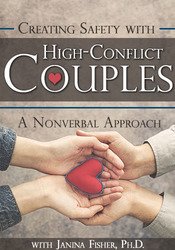

High-conflict couples can stop even the most experienced therapist, turning the office into a verbal boxing ring, and us into referees or speechless bystanders. When our usual ways of working don’t slow the battle, much less transform it, nonverbal approaches can help volatile couples move beyond their habitual escalations.
Watch Janina Fisher as she provides simple interventions drawn from Sensorimotor Psychotherapy that teach couples how to create safety and real intimacy in their relationships.
| File type | File name | Number of pages | |
|---|---|---|---|
| Manual - Creating Safety with High-Conflict Couples: A Nonverbal Approach (1.40 MB) | 23 Pages | Available after Purchase | |
| Manual - Creating Safety with High-Conflict Couples: A Nonverbal Approach - French (1.40 MB) | 23 Pages | Available after Purchase | |
| Manual - Creating Safety with High-Conflict Couples: A Nonverbal Approach - French (1.40 MB) | 23 Pages | Available after Purchase | |
| Manual - Creating Safety with High-Conflict Couples: A Nonverbal Approach - Italian (1.40 MB) | 23 Pages | Available after Purchase | |
| Manual - Creating Safety with High-Conflict Couples: A Nonverbal Approach - Italian (1.40 MB) | 23 Pages | Available after Purchase |

Janina Fisher, PhD, is a licensed clinical psychologist and former instructor at The Trauma Center, a research and treatment center founded by Bessel van der Kolk. Known as an expert on the treatment of trauma, Dr. Fisher has also been treating individuals, couples, and families since 1980.
She is the past president of the New England Society for the Treatment of Trauma and Dissociation, an EMDR International Association Credit Provider, Assistant Educational Director of the Sensorimotor Psychotherapy Institute, and a former Instructor, Harvard Medical School. Dr. Fisher lectures and teaches nationally and internationally on topics related to the integration of the neurobiological research and newer trauma treatment paradigms into traditional therapeutic modalities.
She is co-author with Pat Ogden of Sensorimotor Psychotherapy: Interventions for Attachment and Trauma (2015) and author of Healing the Fragmented Selves of Trauma Survivors: Overcoming Internal Self-Alienation (2017) and the forthcoming book, Working with the Neurobiological Legacy of Trauma (in press).
Speaker Disclosures:
Financial: Dr. Janina Fisher is an international expert and consultant on Trauma and Dissociation. She is a consultant for Khiron House Clinics and the Massachusetts Department of MH Restraint and Seclusion Initiative. Dr. Fisher receives royalties as a published author. She receives a speaking honorarium, recording royalties and book royalties from Psychotherapy Networker and PESI, Inc. Dr. Fisher has no relevant financial relationships with ineligible organizations.
Non-financial: Dr. Janina Fisher is on the advisory board for the Trauma Research Foundation. She is a patron of the Bowlby Center.
Please wait ...